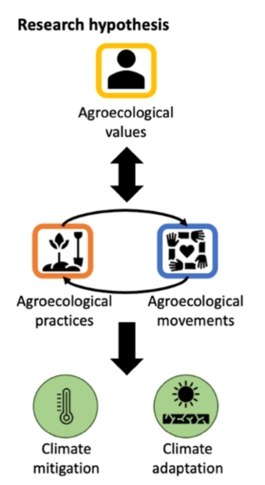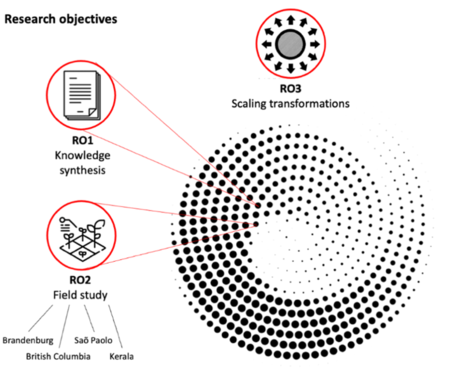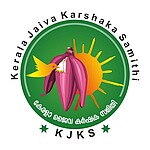This project focuses on agroecological transitions, defined as the intentional diversification of farming landscapes in collaboration with social movements and networks to create landscapes that foster dignified work, conservation of biodiversity, and mitigation of and adaptation to climate change. We particularly focus on transitions to diversified perennial systems.

Diversified perennialization (often referred to as agroforestry) involves integrating annual and perennial crops and trees into the same farming system. Compared to annual cropping systems that currently dominate global agriculture and markets, perennial crops show great promise for climate adaptation and mitigation because of their contributions to carbon sequestration in tree biomass and soil organic carbon, as well as reduced chemical fertilizer and pesticide use and their buffering effects against soil degradation, drought , and other forms of extreme weather and climate variability.
Our Hypothesis: Agroecology has the greatest impact on climate mitigation and adaptation when farmers combine agroecological practices with engagement in agroecological movements, grounded in agroecological values.
This project builds on transdisciplinary research on agroecological transitions with vulnerable farming communities in Canada, Germany, India, and Brazil. We are examining the influence of agroecological networks (farming organizations, institutional actors, and consumer groups) in promoting the perennialization of agriculture to support climate adaptation (improving resilience in livelihoods and food security) and mitigation (increasing carbon sequestration). This project works directly with farming communities, social movements, and policy makers to improve evidence-based decision-making to assess the potential of agroecological transitions for climate adaptation and mitigation.
Project Objectives:
- Synthesis: Use a participatory action research approach to test the relationships between personal, political, and practical leverage points driving the adoption of agroforestry and other practices supporting agricultural perennialization.
- Field Study: Work with farmer networks in each case study to test climate mitigation and adaptation outcomes across a diversification gradient, from low-diversity farming systems to perennial and agroforestry-based management systems.
- Scaling Transformations: Use qualitative and quantitative methods to assess climate mitigation and adaptation outcomes and estimate the potential of agroecology to support the scaling of perennial and agroforestry practices.

A cross-case synthesis will take local institutional, environmental, and relational contexts into account to inform decision-making, as well as to improve our understanding of the roles of agroecological movements, practices, and values in fostering climate resilient communities worldwide.
Funded By

The New Frontiers in Research Fund (NFRF) which supports world-leading interdisciplinary, international, high-risk / high-reward, transformative and rapid-response Canadian-led research.

The Deutsche Forschungsgemeinschaft (DFG, German Research Foundation) is the central self-governing research funding organisation in Germany.

A Fundação de Amparo à Pesquisa do Estado de São Paulo (FAPESP) is a public foundation, funded by the taxpayer in the State of São Paulo, with the mission to support research projects in higher education and research institutions, in all fields of knowledge.







